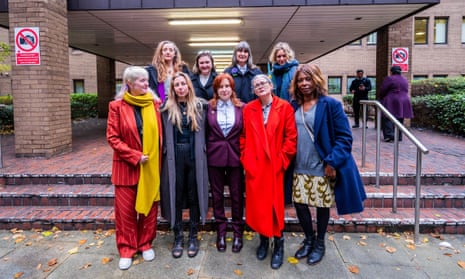In 2021, I was arrested with eight other women for breaking the windows at HSBC’s headquarters in London. On Thursday, after just two hours of deliberation, a jury of our peers found all nine of us not guilty of nearly half a million pounds in criminal damage.
Although the three-week trial was the most gruelling experience of my life, I trusted the jury to acquit us for two reasons. First, I believe the human spirit is basically good and cooperative, and when given the chance we will make decisions that are compassionate and fair.
Second, I think people have had enough.
We’ve had enough of what the UN secretary general, António Guterres, called the “moral and economic madness” of investing in new fossil fuel infrastructure. Much like the hundreds of new oil and gas licences recently granted by Rishi Sunak. We’ve had enough of companies like HSBC, which invested more than £80bn into fossil fuel infrastructure in the five years following the 2015 Paris climate agreement.
During the trial I thought a lot about human “conscience”, and how it works. The Latin and Greek roots of the word direct us to the idea of sharing knowledge with oneself. Moral judgment has to involve a process of exchanging information – factual, emotional and contextual information – and applying that knowledge without special interests, intimidation or obfuscation.

In conveying the wider context beyond simply what happened one April morning in 2021 – the context of catastrophic climate breakdown and the role of banks – we trusted the jury to put their knowledge to work.
At no point did any of us deny that we used hammers and chisels to carefully break the glass of HSBC’s windows. But not all damage is created equal. It’s the context that matters, and there comes a point in every tough choice when we realise we know enough to be able to make an informed decision.
The establishment needs order and consistency to maintain its power. But shaking off the myth of the selfish “economic man”, turning our backs on the culture war and coming together, returning to a quiet faith in the human spirit and the human conscience and trusting ourselves again – these things are the harbingers of great change.
For the last six months I’ve been working with a small group of community organisers in Hull to find out what it would take to radically transform democracy in this country, from the ground up. We’re called Cooperation Hull, and I believe that people’s assemblies – public meetings where everyday people deliberate and make decisions together – are how we will choose a different world for our children. They are, in the words of longtime Hull organiser Adam Hawley, “places where the culture war dissolves”.
There is something similar about people’s assemblies and juries – they feel almost mythical in their democratic nature. And both are based on an element of human society that is seriously endangered: trust. Trust in the collective wisdom of a group of strangers. Trust in each other, that we will tell the truth and be able to recognise it when we hear it. Trust that when the corrupting forces of money and status are removed from the equation, the human conscience can be relied upon to sense the right way forward.
Gully Bujak worked with Extinction Rebellion for several years and is now a community organiser in Hull
Do you have an opinion on the issues raised in this article? If you would like to submit a response of up to 300 words by email to be considered for publication in our letters section, please click here.
